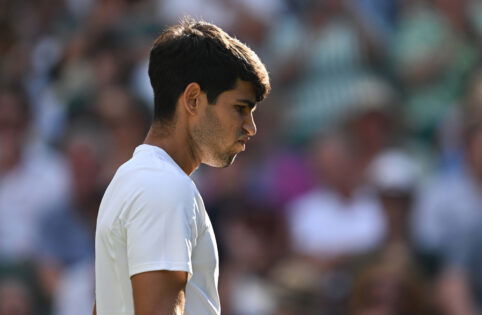Physical injuries are easy to spot. A limp, a taped wrist, or a medical time-out says it all. But mental struggles? They often play out in silence, behind the smiles and match-day routines. For tennis players, who spend 11 months a year hopping continents and chasing rankings, the toll of the sport isn’t always visible. Over the past few years, more players have started opening up about mental health. And now, Carlos Alcaraz is also opening up.
Recently, Alexander Zverev has been searching for answers that may lie far from the baseline. His recent dip in form has raised eyebrows, but he’s not hiding from what’s really going on. “It’s funny, I feel very alone out there at times. I struggle mentally,” he said. “I don’t know. It’s difficult to find joy outside the tennis court for me at the moment.”
Zverev’s words echo what many pros have privately admitted for years. The joy of playing can fade when the pressure to win never takes a day off. For Ons Jabeur, stepping back felt like the only option. The former World No.2 recently announced a break from tennis, citing mental burnout.
Her words struck a chord across the tennis world. And they weren’t the only ones making headlines. Carlos Alcaraz also opened up about his approach to mental health. In an interview with Gazzetta, he revealed he’s been working with a mental coach. The Spaniard said, “Yes, I’ve had her for about five years now, and she helps me a lot. I really feel the difference compared to the past. Sometimes I get negative thoughts, but she helps me manage them. She gave me advice on how to deal with match stress, and things have improved a lot. Like I said, it’s all in the head. But it’s not just a mental issue: it also depends on the match, how you approach it, everything.”
His mental strength was clearly on display when the 22-year-old pulled off one of the greatest comebacks in recent memory at Roland Garros, saving three championship points against Jannik Sinner before storming back from two sets down to win the title.
2025 Roland-Garros – Men s Single Final PARIS, FRANCE – JUNE 8: Carlos Alcaraz of Spain competes against Jannik Sinner not seen of Italy during the Men s Single Final match on the day 15 of French Open tennis tournament on Court Philippe-Chatrier at the Roland-Garros Complex in Paris, France on June 8, 2025. Mustafa Yalcin / Anadolu Paris France. Editorial use only. Please get in touch for any other usage. PUBLICATIONxNOTxINxTURxUSAxCANxUKxJPNxITAxFRAxAUSxESPxBELxKORxRSAxHKGxNZL Copyright: x2025xAnadoluxMustafaxYalcinx
Also, he’s not alone in seeking help off the court. Iga Swiatek has been working closely with her sports psychologist, Daria Abramowicz, for years. Andy Murray, too, has leaned on mental support. He once worked with Alexis Castorri, a sports psychologist recommended by his coach Ivan Lendl. And Madison Keys, who lifted the 2025 Australian Open trophy, said therapy played a big part in her breakthrough.
All of this matters even more in a season like this one.
Carlos Alcaraz’s words ring true as Canada Open sees various withdrawals
The tennis calendar continues to test even the toughest players. The Canada Open, for the first time in its history, is being held over 12 days to align with the ATP’s expanded Masters 1000 schedule. This change, however, came at a cost. The gap between Wimbledon and the North American hard-court swing shrank. The result? A long list of high-profile withdrawals.
Carlos Alcaraz, Jannik Sinner, Novak Djokovic, Jack Draper, Sebastian Korda, Hubert Hurkacz, and Jordan Thompson all pulled out. On the women’s side, Aryna Sabalenka, Zheng Qinwen, Ons Jabeur, and Paula Badosa followed suit.
Last year, Alcaraz had already voiced concern about the packed schedule. In a September 2024 interview with Punto de Break, he said, “Many believe that this is a good calendar, but others think there are too many mandatory tournaments and there will probably be years with even more…Right now, there are many players injured due to the calendar and other factors, but at some point, there will be players who will have to skip tournaments because they have to take care of their bodies, families, and other aspects of life besides tennis.”
He might have been predicting this exact moment. The spotlight on mental health is growing. And if top players are already reaching their limits, maybe it’s time the sport took a long, hard look at what it demands. Do you think the tennis schedule needs an overhaul?
The post Carlos Alcaraz Gets Candid on Dealing With Mental Health Issues: ‘I Get Negative Thoughts’ appeared first on EssentiallySports.
